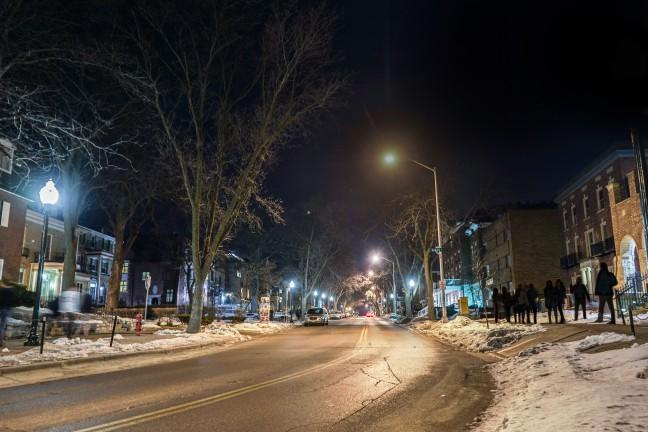While Greek life communities across the nation have long been criticized for higher rates of sexual assault, few comprehensive studies have been able to confirm the notion at University of Wisconsin — until recently.
Numbers from a landmark 2015 survey confirmed disproportionately high rates of sexual assault at UW’s Greek houses, causing one of the first major Greek life sexual assault policy changes in recent history.
Prompted by the university task force charged with evaluating last year’s Association of American Universities’ survey, leaders of the Greek Council executive boards have formed a Greek life task force to formulate and implement six recommendations in spring and fall to lower the prevalence of sexual assault in their community.
While The AAU Campus Climate Survey on Sexual Assault and Sexual Misconduct pegged UW as having one of the highest prevalences of sexual assault among the 26 other universities that participated, it offered UW officials the first comprehensive data to adequately act on the issue, UW spokesperson Meredith McGlone said.
The AAU national survey’s design did not specify Greek housing as a campus area, but rather separated it into off and on-campus categories, Jeanette Kowalik, University Health Services director of prevention and campus health services who evaluated the survey data for UW, said in an email to The Badger Herald.
Greek houses at UW are located only off-campus, so when evaluating the survey, Kowalik said the best estimate — the one that the task force based their recommendations on— is to combine the two categories.
The task force found a total of 32 percent of all undergraduate female victims experienced sexual assault by force (non-consensual penetration) and 34 percent by incapacitation (under the influence of drugs and/or alcohol) at Greek houses.
While UW urged the Greek community to address sexual assault, McGlone said the Greek life task force is only one piece of a broader campus response to the AAU survey findings. UW will unveil these broader plans Feb. 9 to address disproportionalities of perpetrators in places like university housing, as well as higher instances of assault among those with disabilities.

A considerable step forward
The new Greek life task force is one of the first comprehensive efforts to address the culture surrounding sexual assault in a specific community, Eric Knueve, UW Center for Leadership and Involvement director, said.
The Greek life task force, along with the help of UHS, will implement their six new recommendations over the spring and fall semesters to reduce rates of sexual assault.
Rejecting silence: Student survivors take control, speak out on sexual violence
The recommendations include implementing additional bystander intervention training for all new fraternity and sorority members, having at least one support member knowledgeable of sexual assault campus resources who can listen, support and advise victims and creating a fraternity specific Go Greek Info Session.
The other measures consist of focusing on accountability through amending Greek chapters’ individual bylaws regarding sexual assault, requiring peer-to-peer discussion between Greek houses and campus organizations dealing with gender violence prevention and risk reduction and encouraging Greek participation in those groups.
Individual Greek chapters have occasionally required members to discuss sexual assault, but their practices were inconsistent, Sarah Laudon, former Panhellenic vice president of risk management and student leader in the task force, said.
She said the new task force will help streamline standards of sexual assault awareness for all UW Greek organizations.
“We’re finally taking action and putting a plan into implementation,” Laudon said. “To my knowledge, this is the best plan that Greek life has made to address this.”
The task force is also one of the more extensive efforts where all four Greek councils — Interfraternity Council, Panhellenic Association, National Panhellenic Council and Multicultural Greek Council — have worked together, Devon Hamilton, task force leader and Lambda Theta Phi fraternity president, said.
Creating their own solutions
In formulating recommendations for their task force to implement, Greek life leaders from all councils looked to the wider university task force recommendations for ideas, their respective memberships and practices at other universities, Laudon said.
They then worked in consultation with UHS experts who recommended sexual assault prevention efforts, Samantha Johnson, a UHS specialist who worked with the group, said.
The Greek life task force presented their final six recommendations to Chancellor Rebecca Blank Dec. 14.
McGlone said the Greek life task force’s first recommendation, additional bystander intervention training, was part of the university task force’s general recommendations, and will be rolled out to all UW students. The Greek task force, however, decided to make the new training mandatory for all their members.
University of Wisconsin under federal investigation for handling of sexual assault cases
Knueve said UHS will purchase a classroom-style, 1.5 hour program that will focus on intervening in instances of attempted sexual assault. Greek houses will begin implementing the program in fall. Because the program is part of a campus-wide initiative, McGlone said the program will cost roughly $25,000 (excluding staff time and wages) and will be funded through student segregated fees.
The program will add on to bystander intervention training already required for Greek members that focuses on minimizing dangerous drinking behaviors: Badgers Step UP!
Because of a lack of resources, only incoming members will receive the intervention training, Laudon said. But part of the program will require 20 to 40-minute booster sessions that chapters can incorporate into their meetings to promote discussion between new and old members on what they have learned, she said.
Johnson said UHS staff will lead the new 1.5 hour training but they also hope to train Greek life leaders and risk managers to eventually co-lead.
Hasan Nadeem, Men Against Sexual Assault co-founder and member of Psi Upsilon fraternity, said the additional training will help encourage preventing sexual assault.
“You have to tell people sexual assault isn’t okay…and [that their] job is to call out any behavior that might lead to it, or even the act itself,” Nadeem said. “Once you have all these units of change on the ground, you’re actually preventing real cases from happening.”
Because college is a time of introspection and evaluating values, programs like intervention training can affect attitudes — especially among bystanders and acquaintances of perpetrators who condone sexual assault, Ronald John May, former UW psychology instructor and expert on male development who worked with UW fraternity members on sexual assault issues in the ’90s, said.
Repeated exposure to training in places like chapter meetings, which the bystander intervention training will include with its booster sessions, increases the likelihood the training will stick.
“The more people you get involved in the community in consciousness raising, the better,” May said.
According to the AAU survey report, 78 percent of UW students who reported witnessing a drunk person heading for a sexual encounter indicated they did not intervene.
This spring, the task force will pilot their second recommendation, the survivor support program, in collaboration with UHS. The program will require one individual in every fraternity and sorority who is knowledgeable of campus resources to listen to, assess needs and support choices of sexual assault victims.

Keeping chapters accountable
Laudon said Greek chapters will work with UW’s Title IX coordinator to amend all Greek Governance Councils’ bylaws and constitutions to include language that defines sexual assault, their stance against it and consequences for violating the definition.
She added that if chapters do not complete their required trainings, they’ll be forced into poor standing.
Still, Laudon and Hamilton said they prefer using incentives rather than punishment to persuade the Greek community to successfully implement the recommendations. Laudon said sororities play a special role in holding fraternities’ behavior accountable through choosing to only associate with fraternities that are not on probation.
But Laudon said possibly the greatest way to uphold accountability and incite incremental change is through the task force’s fifth and sixth recommendations. The recommendations require peer-to-peer discussion between Greek chapters and gender violence and risk reduction organizations and encouraging at least 6 percent of active Greek members to get involved in these programs.
Greek life will begin piloting the programs this spring, and will develop a reporting mechanism to track Greek participation.
Laudon said in a milestone breakthrough study at University of Leeds, researchers found it takes just 6 percent of a population to change the direction of a crowd.
“We hope that we’ll start changing the direction of the culture,” Laudon said. “Over time these values will catch on and become a real part of our chapters.”
Correction: Athletics will not be part of UW’s plan to address disproportionalities of perpetrators as it was not addressed in the AAU survey.


















